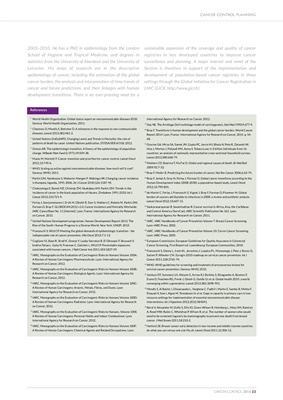
E
liminating cancer as a cause of death is a bold
ambition. But it is at the front and centre of our
thoughts as we devise new ways of redefining cancer
treatment and restoring the lives of patients. These may be
big ambitions but I believe that AstraZeneca and
MedImmune are uniquely placed to deliver. We have an
exciting portfolio of small and large molecules, which offer
opportunities to pick the best combinations for the right
cancers and initiate pivotal studies.
Delivery of these ambitions is against a backdrop of a
rapidly changing global health care environment. Health care
is becoming more personalized, treatments are becoming
more targeted, and economic pressures mean governments
and health care systems are demanding increasingly costeffective
solutions to health care problems.
In order to meet these challenges, we need to create a
perfect combination at the very start and I'm not talking
about drug combinations. We recognize that a lot of great
science and innovation thrives outside of our own
laboratories. And that by accessing and combining the best
science wherever it may be coming from, we will accelerate
the delivery of the next generation of medicines to the
patients who need them.
"Open innovation" is a term that I see every day. But what
does it mean for my team at AstraZeneca? We are continually
looking at ways to make ourselves more "porous" to the
external environment: academia, industry and government
departments. Earlier this year we launched our dedicated
"Open Innovation" website, which is our "shop-front" for
collaborations across all stages of drug discovery. The
AstraZeneca Open Innovation platform helps us work at the
crossroads of different scientific disciplines, where true
creativity and innovation occurs and progress can be
accelerated.
In oncology, we are attacking cancer using a four-front
offensive; we are focused on delivering medicines that target
key tumour drivers and mechanisms of resistance,
overcoming the barriers to tumour cell killing, developing
antibody drug conjugates to deliver chemotherapy in a highly
targeted way and harnessing the power of the immune
system through the exciting area of immuno-oncology. This
work takes place across the globe; both within our own labs
and through a variety of collaborations. We are fortunate to
have a number of highly effective such partnerships in Asia.
Our work with Hutchison MediPharma of China is part of a
global licensing, co-development and commercialization
agreement for Volitinib, a novel, targeted approach for the
treatment of cancer. Volitinib entered Phase I testing in
China in June 2013. The study has two primary objectives: to
evaluate safety and tolerability in advanced cancer patients
in China and to determine the maximum tolerated dose of the
drug candidate. The study will also evaluate Volitinib's
preliminary efficacy against various tumours, including lung
and gastric cancer.
Our collaboration with Taiwan's National Research
Program for Biopharmaceuticals connects physicians and
scientists with a wide range of high-quality, small molecule
compounds and biologics developed by AstraZeneca.
Successful research proposals will explore new therapeutic
uses, which may lead to the development of novel therapies
for patients in oncology and other areas of high interest.
In March 2014, AstraZeneca announced a memorandum of
understanding with the Korea Health Industry Development
Institute (KHIDI) to establish an oncology research
programme. AstraZeneca will provide support for 12 earlystage translational
research projects by Korean investigators
in the field of oncology, with a focus on early-stage
translational research. Successful researchers will also
benefit from technological advice, collaboration and
networking with AstraZeneca oncology scientists globally.
ASTRAZENECA: DRIVING ONCOLOGY
COLLABORATION IN ASIA
SUSAN GALBRAITH, PHD, VP AND HEAD OF ONCOLOGY INNOVATIVE MEDICINES UNIT, ASTRAZENECA
SPONSORED FEATURE: ASTRAZENECA
24 CANCER CONTROL 2014